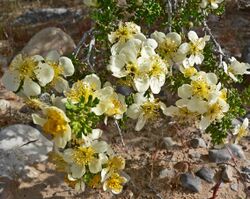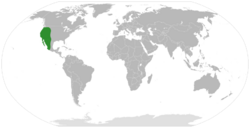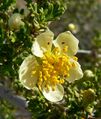Biology:Purshia
| Purshia | |
|---|---|

| |
| Purshia stansburyana | |
| Scientific classification Error creating thumbnail: Unable to save thumbnail to destination
| |
| Kingdom: | Plantae |
| Clade: | Tracheophytes |
| Clade: | Angiosperms |
| Clade: | Eudicots |
| Clade: | Rosids |
| Order: | Rosales |
| Family: | Rosaceae |
| Subfamily: | Dryadoideae |
| Genus: | Purshia DC. ex Poir. |
| Type species | |
| Purshia tridentata | |

| |
| Range | |
| Synonyms | |
| |
Purshia (bitterbrush or cliff-rose) is a small genus of 5–8 species of flowering plants in the family Rosaceae which are native to western North America.
Description
Purshia species form deciduous or evergreen shrubs, typically reaching 0.3–5 metres (1–16 1⁄2 feet) tall. The leaves are 1–3 centimetres (1⁄2–1 1⁄4 inches) long, deeply three- to five-lobed, with revolute margins. The flowers are 1–2 cm in diameter, with five white to pale yellow or pink petals and yellow stamens. The fruit is a cluster of dry, slender, leathery achenes which are 2–6 cm long. The roots have nodules that host nitrogen-fixing Frankia bacterium.[1]
Taxonomy
Taxonomic history
The genus was originally placed in the subfamily Rosoideae.[2] In the past, the evergreen species were treated separately in the genus Cowania; this genus is still accepted by some botanists.
Modern classification
The classification of Purshia within the family Rosaceae has been unclear.[3][4] It is now placed in the subfamily Dryadoideae.[2]
Species
Purshia comprises the following species:[5][6]
- Purshia ericifolia (Torr. ex A.Gray) Henr. – Heath cliffrose (Texas)
- Purshia glandulosa Curran – Desert bitterbrush (Nevada, Utah, Arizona)
- Purshia mexicana (D.Don) Henr. – Mexican cliffrose (Mexico, Arizona)
- Purshia pinkavae Schaack – Pinkava's cliffrose (Arizona)
- Purshia plicata (D.Don) Henrard (syn. Cowania plicata) – Antelope bush (Nuevo León, Mexico).
- Purshia stansburyana (Torr.) Henr. – Stansbury cliffrose (Idaho south to California, Arizona and New Mexico)
- Purshia tridentata (Pursh) DC. – Antelope bitterbrush (British Columbia south to California and New Mexico)
Hybrids
The following hybrid has been described:[5]
- Purshia × subintegra (Kearney) Henr. (P. pinkavae × P. stansburyana) – (Arizona)
Species names with uncertain taxonomic status
The status of the following species and hybrids is unresolved:[5]
- Purshia ciliata Dennst.
- Purshia mollis Lehm.
- Purshia plicata (D.Don) Henr.
- Purshia subintegra (Kearney) Henrickson
Distribution and habitat
The genus is native to western North America, where the species grow in dry climates from southeast British Columbia, Canada , south throughout the western United States to northern Mexico.
Gallery
References
- ↑ Swensen, S.M.; Mullin, B.C. (1997). "The impact of molecular systematics on hypotheses for the evolution of root nodule symbioses and implications for expanding symbioses to new host plant genera". Plant and Soil 194 (1–2): 185–192. doi:10.1023/A:1004240004063.
- ↑ 2.0 2.1 Potter, D.; Eriksson, T.; Evans, R.C.; Oh, S.; Smedmark, J.E.E.; Morgan, D.R.; Kerr, M.; Robertson, K.R. et al. (2007). "Phylogeny and classification of Rosaceae". Plant Systematics and Evolution 266 (1–2): 5–43. doi:10.1007/s00606-007-0539-9.
- ↑ Morgan, D.R.; Soltis, D.E.; Robertson, K.R. (1994). "Systematic and evolutionary implications of rbcL sequence variation in Rosaceae". American Journal of Botany 81 (7): 890–903. doi:10.1002/j.1537-2197.1994.tb15570.x.
- ↑ Eriksson, T.; Hibbs, M.S.; Yoder, A.D.; Delwiche, C.F.; Donoghue, M.J. (2003). "The phylogeny of Rosoideae (Rosaceae) based on sequences of the internal transcribed spacers (ITS) of nuclear ribosomal DNA and the trnL/F region of chloroplast DNA". International Journal of Plant Sciences 164 (2): 197–211. doi:10.1086/346163.
- ↑ 5.0 5.1 5.2 "The Plant List entry for Purshia". Royal Botanic Gardens, Kew and the Missouri Botanical Garden. September 2013. http://www.theplantlist.org/1.1/browse/A/Rosaceae/Purshia/.
- ↑ Govaerts R. "Purshia DC. ex Poir.". Board of Trustees of the Royal Botanic Gardens, Kew. https://powo.science.kew.org/taxon/urn:lsid:ipni.org:names:30034502-2.
External links
- Jepson Flora Project: Purshia — (click 'taxon' to see treatments of California native species)
Wikidata ☰ Q2067630 entry
 |




